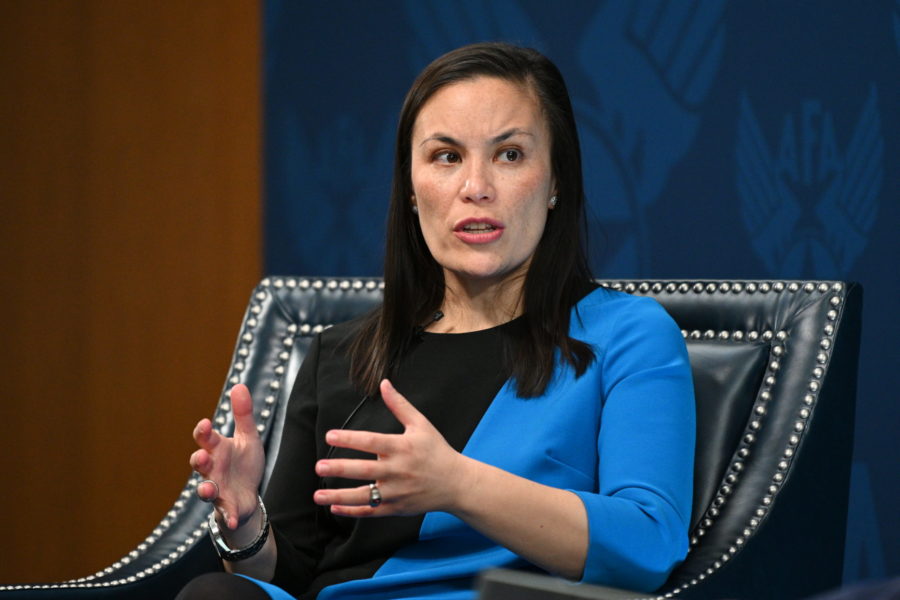When Gina Ortiz Jones walks into the Pentagon, the undersecretary of the Air Force has a clear goal—“to be the undersecretary that I wish I would have had when I was a cadet.”
There’s a particular reason for that. When Jones was first joining the AFROTC at Boston College, she had to sign an agreement saying she would not participate in homosexual behavior as part of the “Don’t Ask, Don’t Tell” policy in place.
That experience was “very formative,” Jones said during an Air Force Association “Air and Space Warfighters in Action” symposium Nov. 30—as formative as her later deployment to Iraq as an intelligence officer.
“So my opportunity to get an education, my opportunity to serve our country, my opportunity to die for our country, all that goes away, just because at the time we didn’t have enough leaders who had the courage to say anybody ready and willing to serve their country should have the opportunity to do so,” Jones said.
Now, Jones said, she wants to be a leader that ensures Airmen can serve to their full potential. And that means working to bridge the divide between commanders’ perceptions of personnel issues, what lower-ranking Airmen say is happening, and their trust in leaders to fix it.
Those gaps in trust and perspectives were highlighted in several recent disparity reports released by the Air Force’s Inspector General, which gathered data on promotions, discipline, and ascensions based on race, ethnicity, and gender, but also gathered feedback from Airmen and Guardians on how they believe the Department of the Air Force handles issues such as harassment and discrimination.
“When we think about the moment in time that we’re in, … we don’t have time or talent to lose, and it’s important, as we think about the pacing challenge, that we are a place where folks understand they can serve to their full potential,” Jones said. “And that is why our policies, everything we do, everything we say, is an expression of the value that we place or do not place on somebody’s service.”
Jones offered an example of a particularly “eye-opening” disparity report, which found that 24 percent of female Airmen and Guardians who had been pregnant while serving said they delayed reporting the pregnancy to superiors out of fear that it would negatively impact their professional opportunities.
“When I talk about, we don’t have time or talent to lose, that is fundamentally about a lack of trust in your leader’s ability to ensure you can serve and make decisions about how you serve,” Jones said.
“This is fundamentally about leadership,” Jones added. “And when we talk about ensuring people can serve to their full potential, you’ve got to understand that there are some unique challenges that folks have that are certainly out of their control, but we as leaders can create an environment that takes down barriers.”
By and large, the reports found that Air Force and Space Force leaders often think they have the tools needed to adequately address those issues—but the rank and file sometimes have a far different view. Nineteen percent of minority Airmen and Guardians said they didn’t trust their chain of command to address issues of “racism, bias, and unequal opportunities,” while 10 percent of female Airmen and Guardians said they didn’t trust leaders to appropriately handle “derogatory comments and behavior that are sexual in nature.”
“In some places there is a significant gap in how leaders understood how well things were going and how the rank and file understood how things were going,” Jones said. “And that’s important, because, again, you can’t lead folks if you don’t know what their challenges are. … And more importantly, if you don’t have a strong understanding of what is underlying some of these challenges, your approach is going to at worse be seen as tone deaf, or potentially be seen as not effective, or potentially counterproductive, right?”
In particular, Jones cited the rate of trust, or lack thereof, women of color in the Air and Space Forces have in their chain of command. Jones publicly pushed for the department to further study the data to understand the intersection of race and gender, and a subsequently released addendum found that Black women in particular had the least trust in leadership to address those issues, with Hispanic and Native American women also reporting relatively low trust.
Those findings, Jones said, are especially important given the findings of another recent study, conducted by the RAND Corporation, that looked into propensity for military service compared to the total eligible population and found women of color have an especially high rate.
Knowing that, Jones said, the Air Force needs to do a better job of addressing incidents like the deaths of Airman 1st Class Natasha Raye Aposhian and Army Spc. Vanessa Guillen, both women of color who were killed by fellow service members.
“If we know who’s got a higher propensity to serve, yet we are not seen as truly understanding just how significant those events were, then we’re going to do ourselves a disservice and not be seen as a place where people can serve to their full potential,” Jones said.
